Every Little Thing Gonna Be Alright (30 page)
Read Every Little Thing Gonna Be Alright Online
Authors: Hank Bordowitz

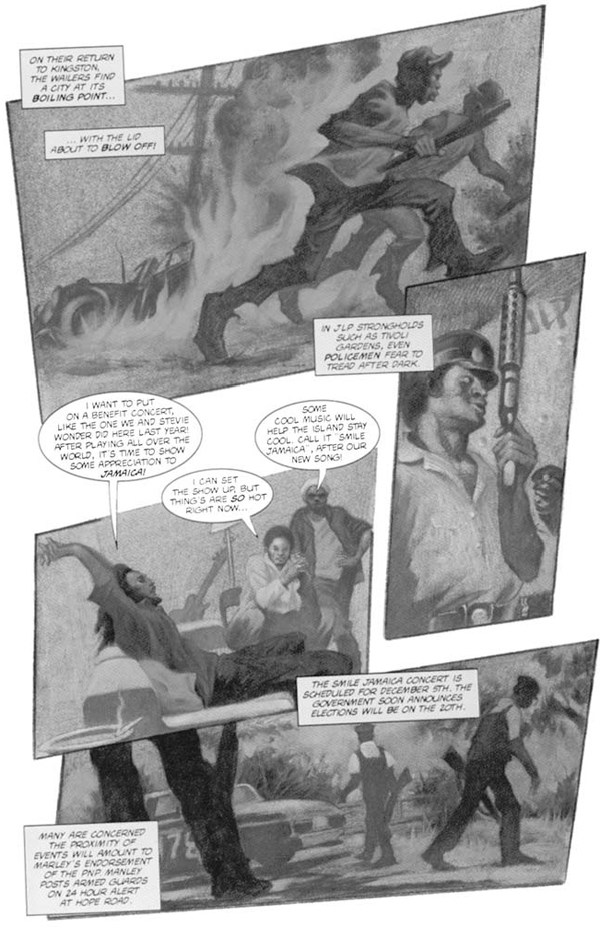
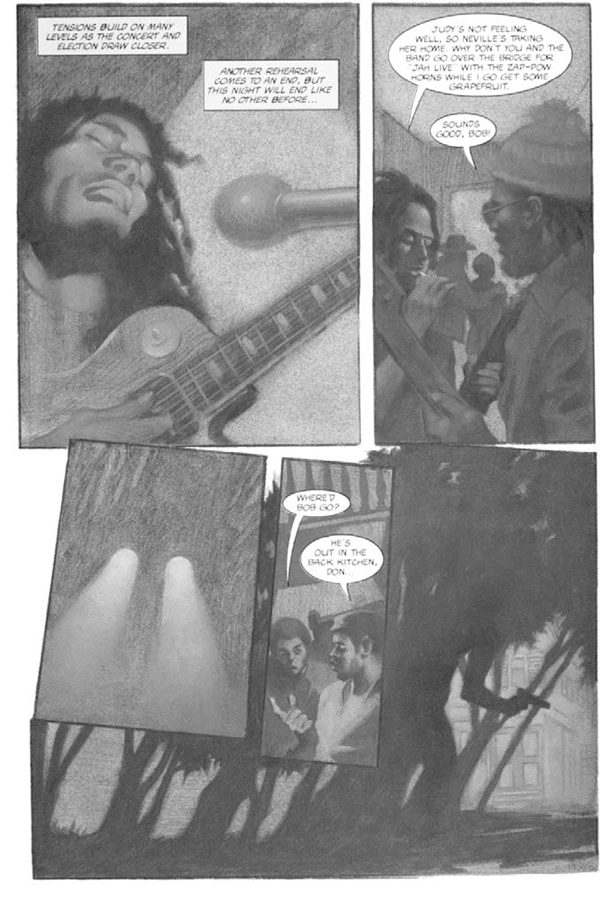
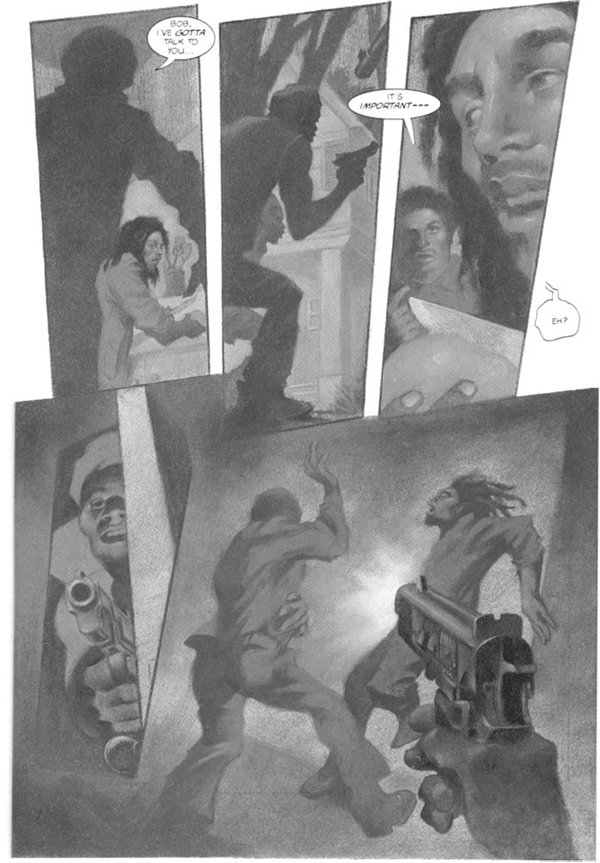
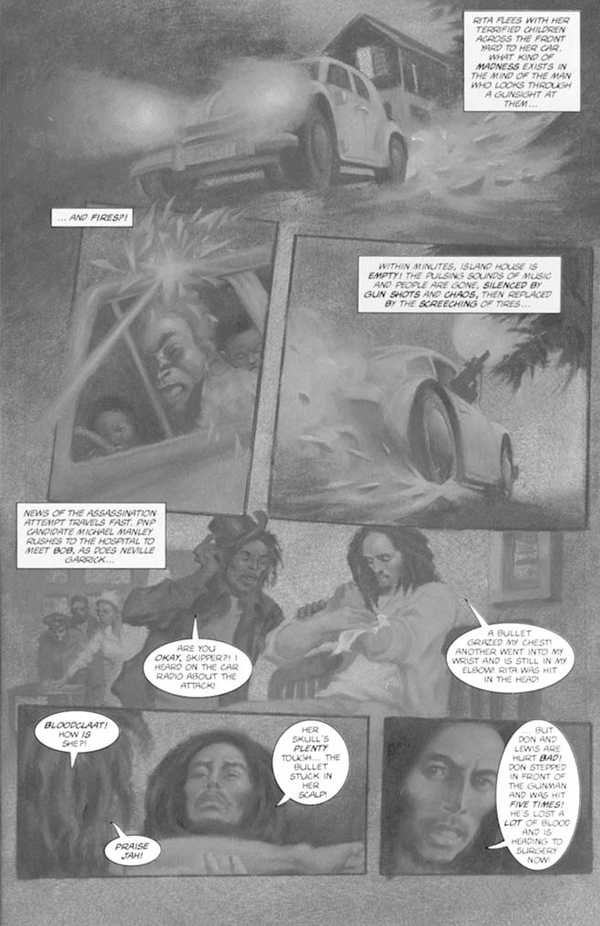
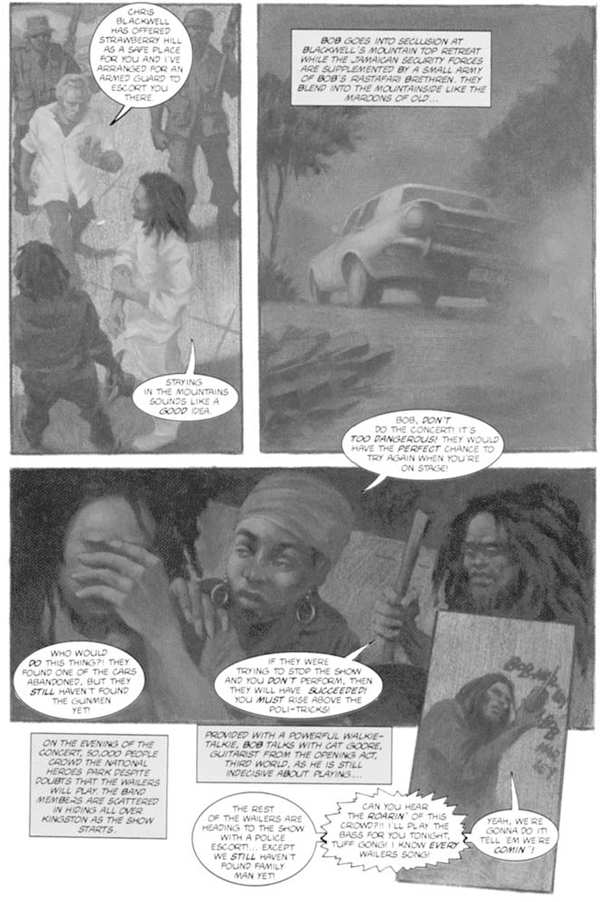

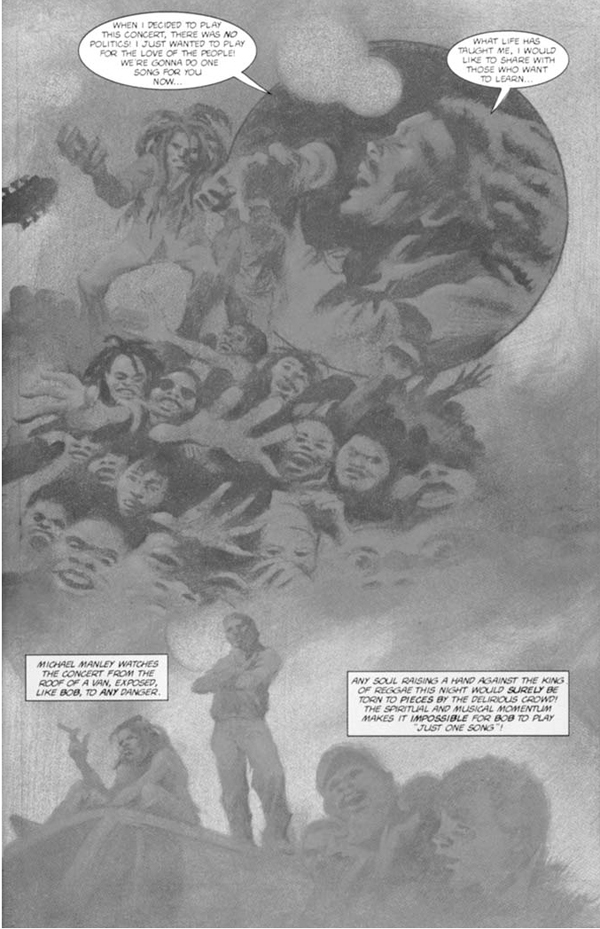
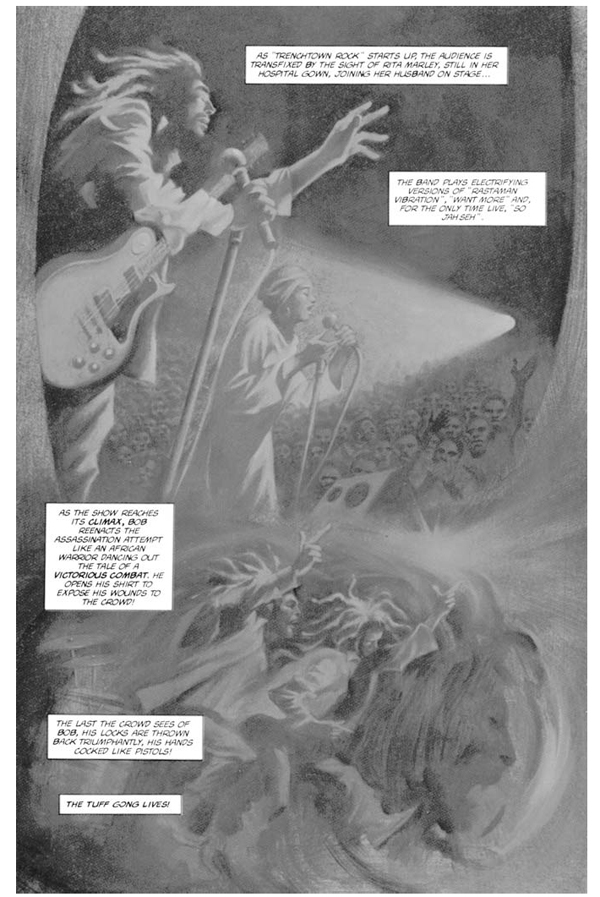
Work: Recording Bob Marley
B
ob Marley only had six years at the top of his game as a touring artist. As such, the majority of people who are familiar with Marley’s music know it through his later studio recordings.
Legend
, the posthumous best-of compilation put out by Island, has become one of those essential records, one of the albums that no collection is complete without. It mostly captures his recordings from those last six years, his days on Island that produced all those global hits.
What Island brought to the party was something that the Jamaican music industry lacked: international distribution and marketing. Island was not only equipped to offer both, it was in fact initially set up to bring reggae to the world, from the days of “My Boy Lollipop” until Chris Blackwell finally sold the company for hundreds of millions of dollars. He continued to bring the best of global sounds to a worldwide audience with his Palm Pictures records, exposing artists like venerable Jamaican guitarist Ernest Ranglin and renowned vocalist Baaba Maal to an enormous range of listeners.
But Marley had been recording for over 10 years before his career caught fire on a global scale. As both Rita Marley and Coxsone Dodd said in the first section of this book, there was a time when Bob lived in the recording studio. It became an environment in which he learned to thrive.

by Richard Williams
(
Source
: Melody Maker,
June 23, 1973
)
T
he Rolling Stones are upstairs in Studio 1, where they’ve been for the past five weeks. Jagger strolls around the foyer, looking for something to do, all neat in white blouson jacket and fawn velvet jeans. But that, you may be surprised to hear, is not where the real action is at this night in Island Studios, Notting Hill.
Not, at any rate, if you’re a Wailers fan. On this occasion, even the Stones’ long-delayed newie comes second to Bob Marley and his brothers from the shanty-towns of Kingston, Jamaica.
The Wailers have been in Britain for some weeks now, playing various kinds of gigs, and generally doing very well. There have been problems: Bunny Livingston never wanted to come in the first place. He’s happy being poor in Jamaica, he says, and he’d rather not witness the fleshy delights of a European metropolis. The temptation might be too great. Nevertheless, he’s here.
There’s a problem, too, with food. Being Rastafarians, they don’t eat meat at all, or fish with scales. So cartons of vegetables and plaice have been delivered most days to their communal house on the Kings Road, and on the road they’ve eaten mostly out of fish ’n’ chip shops. “Huh,” says Bunny, stuffing most of a battered plaice-and-six into his face, “London’s national dish.” No salt, though—that’s also forbidden by the Rasta creed.
In general, they’re delighted with the response they’ve received over here. Only one thing puzzles Marley: when they’ve played at black clubs, the audiences don’t applaud. But the white college audiences have applauded each number loudly.
“Before they came here,” confides an Island person, “they’d never heard of doing encores. So the first night, when they left the stage and the audience carried on cheering, they thought maybe something was wrong. We had to persuade them that it was actually good, and push them back on stage.”
Tonight, anyway, the Wailers are in Studio 2, the smaller one, working on their follow-up to the brilliant
Catch a Fire
album. They laid the rhythm tracks down at Harry J’s studio in Kingston, as is their custom, and have already overdubbed voice parts plus extra guitars and keyboards.
Island boss Chris Blackwell is back from a millionaire-style excursion down the Colorado River, on a 20-foot rubber raft, to supervise the mixing process. He picked up the Wailers for Island in the first place, and is closely involved in their success for various reasons. It’s he who decided that
Catch a Fire
should be packaged as if it were a major rock album, and projected at a whole new market.
Amusingly enough, someone is showing round the original copies of two 1966 Wailers records, “Put it On” and “Who Feels It Knows It,” which came out here on Island. It’s ironical because they were, for all intents and purposes, “pirate” records. Bunny sniffs when he sees them, and goes into a long discussion on the iniquities of the Jamaican record scene.
The session starts with a quick run-through of the rough mixes, which Blackwell is hearing for the first time. As the eight or nine songs glide by, his expression remains on the brighter side of contentment. The raw material is—how shall we put it?—magnificent.
The mixing proper begins with a Marley song called “I Shot The Sheriff,” a sort of humorous musical version of the plot from
The
Harder They Come
(which you should have seen by now, or heaven help you). Marley’s role as lead singer is similar to that of the outlaw character, Ivan, played by Jimmy Cliff in the movie. The high falsetto chorus, delivered by uncharacteristically strained voices, adds to the comic quality.
However, it’s the music that carries this track. Listening to Black-well and his engineer bringing separate instrument tracks up and down, hearing either the bass or the drums in isolation, one begins to grasp the mastery of these men. There are, for example, two rhythm guitars here, chopping through and around each other as if by telepathy. Beneath them runs the suavest, lithest, most inventive bass line, courtesy of Aston “Family Man” Barrett, meshing in perfect sympathy with his brother Carly’s drumming.
Ah, the drumming. Had you noticed that these guys play the bass-drum on 2 and 4, the off-beats? Maybe you remember the fuss when Jo Jones transferred the beat-carrying role from the bass-drum to the hi-hat, with Count Basie’s band in the thirties. Isn’t there just a chance that what the Reggae drummers are doing is equally revolutionary, and might have a similar effect? If that were all they did, it would be noteworthy enough, but when the musicologists start taking this stuff seriously (in, say, ten years’ time), they’re going to find enough material to last them through years of research and analysis.
It’s a bit early in the session to get involved with a masterpiece, but that’s what comes up next. Whatever you thought was the best track on
Catch a Fire
, its equivalent on the new album will be a thing called “Duppy Conqueror”. The song will be familiar to most stone Reggae fans because Bob wrote and cut it a couple of years ago.
The song is reminiscent of both “Put It On” and “Stir It Up” in that it’s built on the familiar “La Bamba” pyramid chord changes, and it resembles “Stir It Up” most of all because the rhythm is a swaying slow-medium. Mostly it’s call-and-response between Bob and the other voices, his nasal asides and interjections growing out of the chorus.
“Yes me friend (me good friend) they say we free again . . . The bars could not hold me (whoo-hoo), force could not control me now. They try to put me down, but Jah put I around now. I been accused (whoo hoo) and wrongly abused now. . . .”
The engineer silences all the tracks except the voices, and suddenly the truly sublime quality of the Wailers’ harmonies is brought home with a vengeance. Have they ever recorded anything a cappella, without instruments? No, says Peter Tosh. You should, says Blackwell. They should indeed.
Music like this is Bob Marley’s forte; soft, supremely sensual, and making its point through understatement. It doesn’t shout at you; rather it insinuates, suffusing the brain like a heady wine. Unfortunately, some otherwise intelligent people have missed the point, and expect him to come on like Toots Hibbert or Desmond Dekker, shouting and bashing. That attitude is so patronizing as to be beneath contempt. Does Wilson Pickett invalidate Smokey Robinson? Of course not. At this point, Jagger walks in. “You’ve met Bob?” says Blackwell. “Uh . . . hi,” says Mick, extending a hand.
The album the Stones are mixing was, of course, recorded in Jamaica, where Jagger met many Reggae musicians until, he says, he got a bit bored with it. He must be getting pretty bored with his own album, too: it’s months since they began it, although he maintains that only seven weeks’ hard work have been put in so far.
Jagger has come to enlist Blackwell’s aid. It seems that Keith Richard’s old lady, Anita, has been staying in Kingston with a Rasta band which Keith plans to produce. Their house was raided, Anita was busted, and she can’t get bail. Blackwell, being rich and of Jamaican descent, might have some pull. “I don’t really have any,” he says, and asks Tosh: “What are the police like with Rastas now? Are they specially hard on them?”
“Depends,” Tosh replies. “Depends on the Rasta, and depends on if he knows the right policeman.”
“Duppy Conqueror” goes round and round, played at least two dozen times, and it could go on for ever. Nobody here would mind. Make a 40- minute tape-loop of it, someone suggests, and there’s your album.
But, of course, there are other songs. “Get up, Stand Up”, “Reincarnated Soul” (out on the B-side of the new single, “Concrete Jungle”), the fabulous “Rastafarian Chant”, Bunny’s “Oppressor Song”, and a beauty from Marley called “Burnin’ And Lootin’”, with another incredible lyric: “Give me the food and let me grow/Let the roots-man take a blow now/All them drugs gon’ make you slow now/it’s not the music of the ghetto . . . ”
The “roots-man” is the man who boils plant roots, distilling a drinkable substance of allegedly spiritual properties. It also makes you high. Nothing one hears suggests that this will be anything less than a worthy successor to the last album, and in “Duppy Conqueror” it will contain a true classic.

by Timothy White
(
Source
: Billboard,
July 13, 1991
)
I
SLAND Records was founded at 13 Connaught Square in London on May 8, 1962, by Christopher Blackwell, scion of an old Anglo- Jamaican trading family. Young Christopher had been an aide-de-camp
to the Governor General of Jamaica, a club owner, professional gambler, manager of 63 rural Jamaican jukeboxes, a motor scooter and water-skiing concessionaire before delving into the Jamaican record business on the production end while also licensing native ska hits for the British market. From the instant he stepped into the Kingston recording arena, Blackwell pioneered virtually every sophisticated modern distribution, production and marketing technique for the reggae industry, as well as rescuing it from the ghetto chaos and sordid technique business practices that commercially had held back the music and the artists.
“Island make a big difference,” declared Bob Marley in 1975. “No cheatin’, no robbin’. Before I sign with Island, I had three albums that I didn’t even know about.”
Not only was Island Records the first company to apply the same artistic standards to reggae as had been customary for rock, but it was also the first label to lavish care on the manufacture and promotion of the recording output of the Caribbean and the rest of the Third World. Whether it was the quality of the vinyl and the pressings, the technical levels of studio craft, the often-pathbreaking design concepts for packaging, the distinctly stylish retail drives, the comprehensive radio initiatives, or the dignified and culturally aware press campaigns, Island always found an ingenious way to reinvent the notion of popular music. Without Island, there might never have been a global reggae enterprise of a pan-cultural concept like world music.
Lastly, while it was Bob Marley who inspired the world with his remarkable music and socio-cultural vision, it was Island Records that worked tirelessly during Marley’s lifetime to make this outreach possible, and the label’s dignified stewardship of the Marley catalog demonstrates the durability of that commitment. From the start, Blackwell’s involvement in Jamaican popular music has plainly been a labor of love.